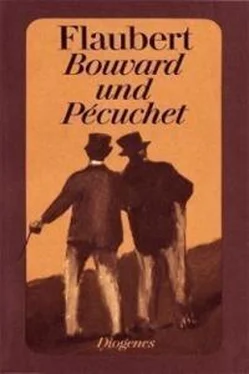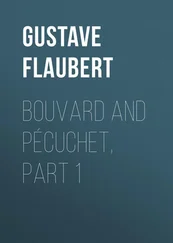The charity workshops lasted a week. No trouble occurred. Gorju left the neighbourhood.
Meanwhile, the National Guard was always on foot: on Sunday, a review; military promenades, occasionally; and, every night, patrols. They disturbed the village. They rang the bells of houses for fun; they made their way into the bedrooms where married couples were snoring on the same bolster; then they uttered broad jokes, and the husband, rising, would go and get them a glass each. Afterwards, they would return to the guard–house to play a hundred of dominoes, would consume a quantity of cider there, and eat cheese, while the sentinel, worn out, would keep opening the door every other minute. There was a prevailing absence of discipline, owing to Beljambe's laxity.
When the days of June came, everyone was in favour of "flying to the relief of Paris"; but Foureau could not leave the mayoral premises, Marescot his office, the doctor his patients, or Girbal his firemen. M. de Faverges was at Cherbourg. Beljambe kept his bed. The captain grumbled: "They did not want me; so much the worse!"—and Bouvard had the wisdom to put restraint on Pécuchet.
The patrols throughout the country were extended farther. They were panic–stricken by the shadow of a haystack, or by the forms of branches. On one occasion the entire National Guard turned and ran. In the moonlight they had observed, under an apple tree, a man with a gun, taking aim at them. At another time, on a dark night, the patrol halting under the beech trees, heard some one close at hand.
"Who is there?"
No answer.
They allowed the person to pursue his course, following him at a distance, for he might have a pistol or a tomahawk; but when they were in the village, within reach of help, the dozen men of the company rushed together upon him, exclaiming:
"Your papers!" They pulled him about and overwhelmed him with insults. The men at the guard–house had gone out. They dragged him there; and by the light of the candle that was burning on top of the stove they at last recognised Gorju.
A wretched greatcoat of lasting was flapping over his shoulders. His toes could be seen through the holes in his boots. Scratches and bruises stained his face with blood. He was fearfully emaciated, and rolled his eyes about like a wolf.
Foureau, coming up speedily, questioned him as to how he chanced to be under the beech trees, what his object was in coming back to Chavignolles, and also as to the employment of his time for the past six weeks.
"That is no business of yours. I have my liberty."
Placquevent searched him to find out whether he had cartridges about him.
They were about to imprison him provisionally.
Bouvard interposed.
"No use," replied the mayor; "we know your opinions."
"Nevertheless―"
"Ha! be careful; I give you warning. Be careful."
Bouvard persisted no further.
Gorju then turned towards Pécuchet: "And you, master, have you not a word to say for me?"
Pécuchet hung down his head, as if he had a suspicion against his innocence.
The poor wretch smiled bitterly.
"I protected you, all the same."
At daybreak, two gendarmes took him to Falaise.
He was not tried before a court–martial, but was sentenced by the civil tribunal to three months' imprisonment for the misdemeanour of language tending towards the destruction of society. From Falaise he wrote to his former employers to send him soon a certificate of good life and morals, and as their signature required to be legalised by the mayor or the deputy, they preferred to ask Marescot to do this little service for them.
They were introduced into a dining–room, decorated with dishes of fine old earthenware; a Boule clock occupied the narrowest shelf. On the mahogany table, without a cloth, were two napkins, a teapot and finger–glasses. Madame Marescot crossed the room in a dressing–gown of blue cashmere. She was a Parisian who was bored with the country. Then the notary came in, with his cap in one hand, a newspaper in the other; and at once, in the most polite fashion, he affixed his seal, although their protégé was a dangerous man.
"Really," said Bouvard, "for a few words―"
"But words lead to crimes, my dear sir, give me leave to say."
"And yet," said Pécuchet, "what line of demarcation can you lay down between innocent and guilty phrases? The thing that just now is prohibited may be subsequently applauded." And he censured the harshness with which the insurgents had been treated.
Marescot naturally rested his case on the necessity of protecting society, the public safety—the supreme law.
"Pardon me!" said Pécuchet, "the right of a single individual is as much entitled to respect as those of all, and you have nothing to oppose to him but force if he turns your axiom upon yourself."
Instead of replying, Marescot lifted his brows disdainfully. Provided that he continued to draw up legal documents, and to live among his plates, in his comfortable little home, injustices of every kind might present themselves without affecting him. Business called him away. He excused himself.
His theory of public safety excited their indignation. The Conservatives now talked like Robespierre.
Another matter for astonishment: Cavaignac was flagging; the Garde Mobile was exposing itself to suspicion. Ledru–Rollin had ruined himself even in Vaucorbeil's estimation. The debates on the Constitution interested nobody, and on the 10th of December all the inhabitants of Chavignolles voted for Bonaparte. The six millions of votes made Pécuchet grow cold with regard to the people, and Bouvard and he proceeded to study the question of universal suffrage.
As it belongs to everybody, it cannot possess intelligence. One ambitious man will always be the leader; the others will follow him like a flock of sheep, the electors not being compelled even to know how to read. This was the reason, in Bouvard's opinion, that there were so many frauds at presidential elections.
"None," replied Bouvard; "I believe rather in the gullibility of the people. Think of all who buy the patent health–restorer, the Dupuytren pomatum, the Châtelaine's water, etc. Those boobies constitute the majority of the electorate, and we submit to their will. Why cannot an income of three thousand francs be made out of rabbits? Because the overcrowding of them is a cause of death. In the same way, through the mere fact of its being a multitude, the germs of stupidity contained in it are developed, and thence result consequences that are incalculable."
"Your scepticism frightens me," said Pécuchet.
At a later period, in the spring, they met M. de Faverges, who apprised them of the expedition to Rome. We should not attack the Italians, but we should require guaranties. Otherwise our influence would be destroyed. Nothing would be more legitimate than this intervention.
Bouvard opened his eyes wide. "On the subject of Poland, you expressed a contrary opinion."
"It is no longer the same thing." It was now a question of the Pope.
And M. de Faverges, when he said, "We wish," "We shall do," "We calculate clearly," represented a group.
Bouvard and Pécuchet were disgusted with the minority quite as much as with the majority. The common people, in short, were just the same as the aristocracy.
The right of intervention appeared dubious to them. They sought for its principles in Calvo, Martens, Vattel; and Bouvard's conclusion was this:
"There may be intervention to restore a prince to the throne, to emancipate a people, or, for the sake of precaution, in view of a public danger. In other cases it is an outrage on the rights of others, an abuse of force, a piece of hypocritical violence."
"And yet," said Pécuchet, "peoples have a solidarity as well as men."
Читать дальше








![Гюстав Флобер - Закат Карфагена [Сборник]](/books/414440/gyustav-flober-zakat-karfagena-sbornik-thumb.webp)


